|
|
|
Sort Order |
|
|
|
Items / Page
|
|
|
|
|
|
|
| Srl | Item |
| 1 |
ID:
086969
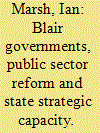

|
|
|
|
|
| Publication |
2009.
|
| Summary/Abstract |
Two books at the end of the Blair era-by Michael Barber and Julian Le Grand-offer to redeem the 'third way'. Both authors explore the political case for public sector reform and the means by which it can be accomplished. They explore a similar range of reform models: command and control; quasi-markets; and devolution and transparency. But the circle between efficiency, client service and continuous improvement must be squared. Neither author considers the 'learning by doing' alternative. No less fundamentally, neither author addresses the political and technical challenges in developing strategy. How are issues to be aired in advance so as to expose evidence and perspectives? How are interests to be engaged and supporting coalitions formed? How are these processes to occur without executive commitment? How are unconventional ideas to be aired without being over-ruled by populist or media sensationalism? These are the practical dilemmas that confounded Blair's efforts. These books invite a strategic conversation that is badly needed. But where in the political system can it be pursued?
|
|
|
|
|
|
|
|
|
|
|
|
|
|
|
|
| 2 |
ID:
086980
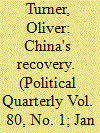

|
|
|
|
|
| Publication |
2009.
|
| Summary/Abstract |
China has been a major power for far longer than is typically acknowledged in the West. This paper seeks to redress established discourse of China as a 'rising' power which now enjoys common usage within Western policy-making, academic and popular circles, particularly within the United States; China can more accurately be conceived of as a 'recovering power'. A tendency by successive Washington administrations to view the world in realist terms has forced the label of 'rising' power onto China along with the negative connotations that inevitably follow. We should acknowledge the folly in utilising a theoretical approach largely devoid of any appreciation for the social and human dimensions of international relations as well as the importance of social discourse in the field. Finally, policy-makers in Washington must reconsider their realist stance and, with a fuller appreciation of world history, recognise that American hegemony was always destined to be short-lived.
|
|
|
|
|
|
|
|
|
|
|
|
|
|
|
|
| 3 |
ID:
086975
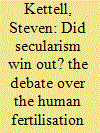

|
|
|
|
|
| Publication |
2009.
|
| Summary/Abstract |
The debate over the 2008 Human Fertilisation and Embryology Bill marks the latest in a series of conflicts between secularism and religion in the public sphere. The failure of religiously motivated campaigners to alter the Bill's most substantive and controversial provisions, however, should not be seen as a victory for a homogeneous secular camp. Although campaigners motivated by religious belief were almost universally opposed to the Bill, secular campaigners reflected a more varied mix of opinion. Moreover, the degree of organisation and mobilisation shown by the religious lobby during the course of the debate, are a sign that attempts to secure a greater role for religion in the public sphere are likely to remain a prominent feature of British political life.
|
|
|
|
|
|
|
|
|
|
|
|
|
|
|
|
| 4 |
ID:
086977


|
|
|
|
|
| Publication |
2009.
|
| Summary/Abstract |
Francis Fukuyama asks: 'Is liberal democracy prey to serious internal contradictions, contradictions so serious that they will eventually undermine it as a political system?' This paper argues that one of these 'internal contradictions' is the political communications process and it can be sufficiently serious to undermine the democratic system-but such an undermining is not inevitable.
|
|
|
|
|
|
|
|
|
|
|
|
|
|
|
|
| 5 |
ID:
086968
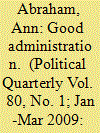

|
|
|
|
|
| Publication |
2009.
|
| Summary/Abstract |
This article relates the concept of 'good administration' to a range of key constitutional issues, including The Governance of Britain, the debate about a British Bill of Rights, the creation of the Administrative Justice and Tribunals Council, and the Law Commission's consultation on public law remedy. It argues that 'good administration', far from being remote from these issues, is a critical component of much that we value most in public life. By drawing upon, for example, the Parliamentary Ombudsman's publication of Principles of Good Administration and the Court of Appeal judgment in a case concerning the Ombudsman's report on occupational pensions, the article suggests that the principles of deliberative democracy, human rights and restorative justice combine to make the Parliamentary Ombudsman an effective instrument for 'humanising the bureaucracy', as first envisaged when the Office was created by the Wilson government in 1967.
|
|
|
|
|
|
|
|
|
|
|
|
|
|
|
|
| 6 |
ID:
086970


|
|
|
|
|
| Publication |
2009.
|
| Summary/Abstract |
This article investigates the working of the 1999 Act of Parliament in relation to the electoral process. One of the more controversial measures in the 1999 Act was the preservation of the representation of the hereditary element in the House of Lords. In the 2007-2008 session of Parliament, Lord Avebury introduced the House of Lords (Amendment) Bill, to repeal this electoral process, and Lord (David) Steel of Aikwood introduced the House of Lords Bill, which had provisions to the same effect as Lord Avebury's Bill. The working of this electoral process is therefore likely to be a topic of debate in the 2008-2009 session of the House of Lords. We suggest that there are three possible options to deal with the likely future issues for this electoral process. These we present as a contribution to a wider debate on the way forward for this constitutional issue.
|
|
|
|
|
|
|
|
|
|
|
|
|
|
|
|
| 7 |
ID:
086973
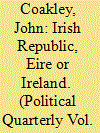

|
|
|
|
|
| Publication |
2009.
|
| Summary/Abstract |
One of the less visible consequences of the Good Friday (Belfast) Agreement of 1998 was that it finally put to rest a fifty year dispute between Ireland and the United Kingdom about the names of the respective states. This article begins by outlining the constitutional background to this complex terminological dispute, and then examines it from three perspectives. The first is that of the Irish state itself, which in recent decades has opted unambiguously for 'Ireland'. The second is the British government, which until the end of the twentieth century preferred the labels 'Eire' or 'Irish Republic'. The third is the militant nationalist republican movement, whose terminology was designed to deny the legitimacy of the existing state. The article concludes by examining the political significance of this issue, arguing that while its most obvious importance is symbolic, it has also had real meaning for the identity and for the geographical definition of the state, as well as for the British-Irish relationship.
|
|
|
|
|
|
|
|
|
|
|
|
|
|
|
|
| 8 |
ID:
086967
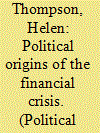

|
|
|
|
|
| Publication |
2009.
|
| Summary/Abstract |
For much of the last decade it was clear that the commercial operations of the government-sponsored enterprises Fannie Mae and Freddie Mac were creating an increasing systemic financial risk. That risk was compounded by the fact that the Japanese and Chinese central banks were acting as cheap creditors. The Bush administration and some Republicans in Congress made efforts from 2001 to create a tougher regulatory framework for Fannie and Freddie. Fannie and Freddie were able to defeat these attempts to constrain their operations by a four-fold political strategy involving campaign contributions to members of Congress, a vast lobbying apparatus, the cultivation of a political language around affordable housing for minorities, and abusing and smearing their regulator. Since Japan and China understood that the US government would have to assume Fannie and Freddie's liabilities in a crisis they had no incentive to expose the political fiction that it would not.
|
|
|
|
|
|
|
|
|
|
|
|
|
|
|
|
| 9 |
ID:
086976
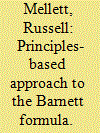

|
|
|
|
|
| Publication |
2009.
|
| Summary/Abstract |
This essay argues that the Barnett formula-which determines the block grant paid annually by the UK government to each of the Devolved Administrations of Scotland, Wales and Northern Ireland-be reformulated, guided by the following principles: fiscal equity, accountability, transparency, and flexibility. The rationale for change is that the current fiscal arrangements make little policy sense and may not be sustainable in a changing political and economic context. The formation of a grants commission to help develop data, calculate disparities, and provide public advice to the Chancellor of the Exchequer is also advocated.
|
|
|
|
|
|
|
|
|
|
|
|
|
|
|
|
| 10 |
ID:
086974
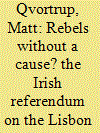

|
|
|
|
|
| Publication |
2009.
|
| Summary/Abstract |
The Irish referendum on the Lisbon Treaty follows a pattern of class-voting also seen in the 2005 referendums on the European Constitution. However, the poll differed in other respects. Polling in the wake of the vote suggested that the main reason given for voting no was a lack of knowledge about the treaty (22 per cent of no voters holding that view). A further 40 per cent of the voters voted no because they claimed not to understand the Treaty. This is in contrast to referendums in 2005 in Spain and the Netherlands where, respectively 70 and 51 per cent, of those with a self confessed 'very limited ' knowledge of the Constitution voted yes.
|
|
|
|
|
|
|
|
|
|
|
|
|
|
|
|
| 11 |
ID:
086978


|
|
|
|
|
| Publication |
2009.
|
| Summary/Abstract |
The Declaration on 'the responsibility to protect' (R2P), unanimously endorsed by the Security Council in April 2006, identified both national and international responsibilities in relation to genocide, ethnic cleansing, war crimes and crimes against humanity. This was highly significant in appearing to accept that the prevention of mass atrocities was a legitimate international concern. Subsequently, there has been some disappointment about the limited practical impact of R2P, and also anxiety that its progress may be impeded by the fear that it is designed to legitimise military intervention. However, this article concentrates on a different concern. Arguing that an earlier version of R2P (in the International Commission on Intervention and Sovereignty of 2001) linked the issues with those of human security and development, it suggests that the contemporary focus is far narrower, undermining its critical potential with regard to the policies of the global North and reducing its appeal to developing countries.
|
|
|
|
|
|
|
|
|
|
|
|
|
|
|
|
| 12 |
ID:
086979
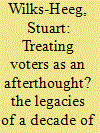

|
|
|
|
|
| Publication |
2009.
|
| Summary/Abstract |
Over the past decade, the UK's New Labour government has been at the forefront of efforts internationally to modernise electoral procedures, promising to deliver 'an e-enabled, multi-channel general election by 2006'. This paper considers the origins and the impacts of reforms to UK electoral procedures with a particular focus on the adoption of postal voting on demand and pilots of electronic voting and counting since 2000. The paper concludes that the principal legacy of the modernisation agenda to date is likely to have been a negative impact on public confidence in the electoral process.
|
|
|
|
|
|
|
|
|
|
|
|
|
|
|
|
| 13 |
ID:
086966
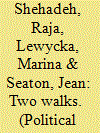

|
|
|
|
|
| Publication |
2009.
|
| Summary/Abstract |
In the summer of 2008 novelist Marina Lewycka and author and human rights lawyer Raja Shehadeh went on two walks: the first in Palestine near Ramallah near the Beit Eil Jewish settlement, the second on Kinder Scout in the Peak District, the site of the mass trespass in 1932 to reclaim the right to walk on the hills. This account of the conversation they recorded on the second walk includes observations by Marina on writing about Palestine and Israel and reflections by Raja about the effect of the Israeli occupation on the fragile Palestinian landscape. It also includes their discussions on writing, walking and the meaning it has to each of them, as well as political comments on the Israeli-Palestinian conflict evoked by visiting these sites. They wonder whether a similar act of resistance would be possible in Palestine and what it would mean to the future of the conflict.
|
|
|
|
|
|
|
|
|
|
|
|
|
|
|
|
|
|
|
|
|